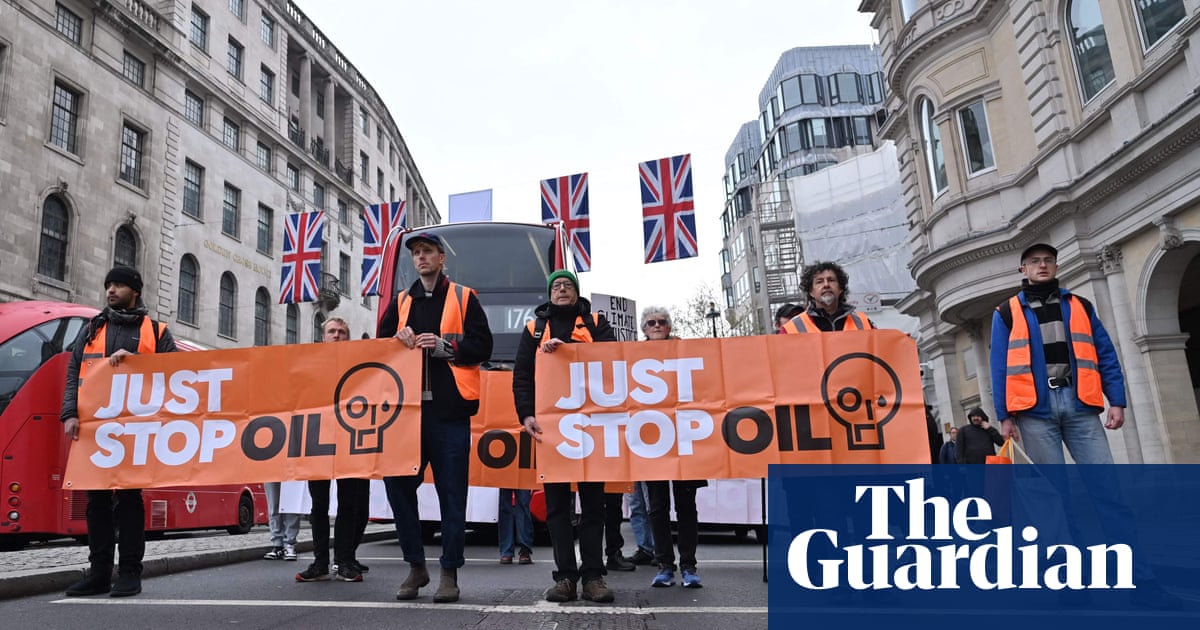
Just Stop Oil has said it will suspend its direct actions against fuel distribution for a week, but has told the prime minister its members will escalate their disruptive protests “if you do not fulfil your duty to the people”.
For two and a half weeks, the climate activists have been targeting oil terminals and oil tankers in the Midlands and the south-east of England with blockades and mass trespass.
The government and petrol retailers have attempted to downplay the scale of the disruption to fuel deliveries. But there have been widespread reports of petrol station forecourts running dry in various parts of the country.
Just Stop Oil’s activists have vowed to continue their campaign until the government agrees to a ban on new oil and gas extraction projects, or until they are all jailed.
A letter to Boris Johnson, read out at Downing Street on Tuesday morning by two campaign supporters, said: “The bill for oil and gas is already being paid by millions around the world, in the global south, and can now also be seen in blood and suffering in Ukraine.
“The truth is that this is the price we are all going to pay for allowing the grip of oil to continue its hold on us. This cost, the horror of war in Europe, must not be used as a pretext to advance an even greater tragedy – that of continuing to invest in new fossil fuel extraction, for which there is no popular support.”
The letter said they would pause their actions until 25 April – next Monday – “to give you the opportunity to make a statement on behalf of the government that it will immediately halt all future licensing and consents for the exploration, development and production of fossil fuels in the UK.
“If you do not fulfil your duty to the people we will be left with no choice but to escalate our campaign of civil resistance.”
On 1 April, Just Stop Oil began its campaign with coordinated blockades targeting 10 oil terminals in Birmingham, Warwickshire, Hampshire, Essex and London. The campaign, which was supported by Extinction Rebellion, aimed to disrupt fuel deliveries, particularly to the south-east and London.
Within days there were anecdotal reports of fuel shortages and while petrol retailers insisted the disruption was manageable, a source at one admitted that was only because it had been able to divert supplies from terminals farther north.
Official figures later showed that in the three days after protests started, deliveries to petrol stations were down 43% in the West Midlands, 44% in London and 48% in the east.
As police battled to minimise the disruption possible from blockades, the protesters shifted tactics. On 6 April they staged their first mass trespass, at the Navigator oil terminal in Grays, Essex, where activists climbed spike-topped fences and ran to a loading bay to obstruct equipment with lock-ons.
Reports of petrol station shortages multiplied, given added weight by a claim by the petrol consumers group FairFuelUK – subsequently reversed – that it had “credible intelligence” that one in three pumps were running dry.
Downing Street condemned the “guerrilla tactics” of protesters, while Priti Patel, the home secretary, said “people across the country [were] seeing their lives brought to a standstill” by disruption, and Labour called for “nationwide injunctions” to ban the protests.
At least three oil distribution companies have obtained injunctions. Last week, the Department for Business, Energy and Industrial Strategy, Navigator Thames, ExxonMobil and Valero were among “a number of key operators in the oil sector” that had obtained court orders to ban protests at their sites.
The department also confirmed that injunctions granted to ban Insulate Britain’s protests on key roads in the south-east were still in force.
Meanwhile, direct actions have continued, with Just Stop Oil saying they will not stop until the government meets their demand, or they are all jailed.
Just Stop Oil said they were still collating their tally, but that the number of arrests linked to the campaign so far could be as high as 1,100. They have previously said about 400 have taken part in the campaign.
On Tuesday morning, five were on remand. Two had been transferred to prison in Essex before a court appearance on charges of aggravated trespass on Wednesday. Three more were brought to London from the Midlands on Tuesday to appear at the high court on charges of breaking an injunction.












